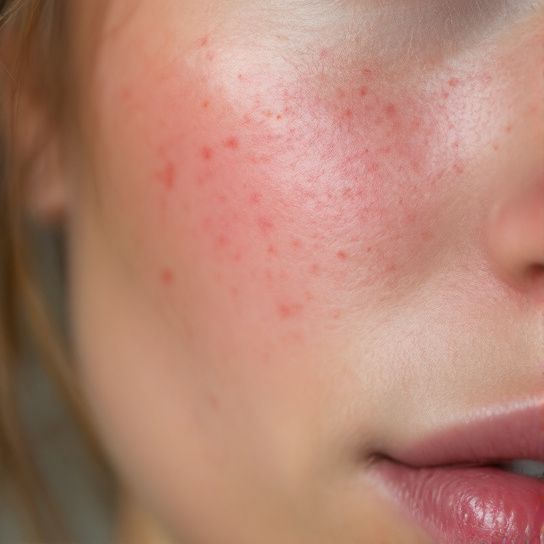Ah, spring! It’s that lovely time of year when flowers bloom, days get longer, and sunshine teases us with the prospect of summer. And oh yes, the dreaded pollen blanketing everything in sight. If you’re among the unlucky ones with spring allergies, you probably brace yourself for the inevitable parade of sniffles, sneezes, and itchy eyes. But let’s not forget about our skin. When allergies strike, sensitive acne can unexpectedly tag along, making this sunlit season feel more like a festive joyride mixed with an obstacle course.
Understanding the Seasonal Sidekick: Sensitive Acne
Think about this—spring rolls around, showers of pollen start swarming the air, and suddenly, your skin starts acting up like it’s auditioning for a soap opera. The familiar, yet tiresome, character of sensitive acne takes the stage, seeking attention at the worst possible moments. It’s like that party guest who arrives uninvited; they won’t leave until you’ve seriously thought about reworking the guest list.
Sensitive acne isn’t just your regular breakouts. It’s fundamentally different. It’s like sensitive skin and acne had a sneaky collaboration, bringing about a condition that’s too overwhelming to ignore. And then pollen enters the scene, making sure to stir the pot. Pollen, being a sneaky nemesis, can clog pores and cause irritation. This leads us to a pretty clear conclusion: if you’re prone to spring allergies, familiar outbreaks aren’t far behind.
How Pollen Affects Your Skin
So, what’s the deal with pollen and our faces anyway? Imagine pollen grains like tiny invaders. They land on your skin and decide it’s their new hangout spot. And if you happen to have sensitive skin, there’s an even larger gathering forming—complete with redness, irritation, and breakouts. It’s not exactly a dream team.
**Skin Irritation and Reaction:**

- Clogged Pores: Those minuscule pollen particles can be deceptively good at finding their way into pores. Clogged pores then lead to skin feeling less like a silky sheet and more like sandpaper.
- Allergy-Induced Inflammation: Many of us experience what feels like our skin fighting a losing battle. Inflammation causes those spots and patches to flair, setting off a chain reaction.
- Barrier Disruption: Let’s not forget how pollen can put skin’s natural barrier to the test, weakening it over time, which preps your face for extra sensitivity and various types of acne.
Feeling a bit miffed? I hear you. It’s all part of the “charming” spring package, unfortunately.
Tips to Calm Your Skin This Spring
Okay, now that we’ve laid out the situation, let’s navigate towards some serenity. Spoilers: tackling sensitive acne during allergy season is a team sport where ally number one is you with smart skin care.
1. Gentle Cleansing? Definitely Do This
No doubt, it starts with routine—simple yet uniquely crucial. Whether you’re starting your day or unwinding at night, incorporating gentle cleansing is like hitting a refresh button for your face.
- Use a Mild Cleanser: Opt for products that are free of fragrances and harsh chemicals. Trust me on this—a gentle cleanser will respect your skin while saying farewell to pollen, dirt, and oil.
- Skip the Hot Water: Keep water lukewarm so as not to exacerbate dry or sensitive skin. Kindness counts even in temperature.
- Be Delicate: Be like an archeologist with a fine brush—meaning use your fingertips gently instead of going at it with a rough pouf.
2. Moisturizing is a Non-Negotiable

Next up, let’s talk moisture. It’s not just about keeping the skin happy, it’s about building a barrier that can sidestep the havoc and distraction caused by allergies.
- Lightweight Moisturizer with SPF: Even in the shade, your skin is not immune to UV rays. Choose a moisturizer with SPF coverage to guard your sensitive canvas.
- Hydrating Ingredients: Look for loveable companions like hyaluronic acid or glycerin in your creamy concoction as they plump and protect.
- Apply Through Day: Gentleness is invaluable, and applying thin layers throughout your day can position your skin at arm’s length from flare-ups.
3. Team Up with Antioxidants
Antioxidants are allies few talk about enough. They’re the capes to your skin’s superheroes, working magic in combating inflammation and stress prompted by allergens.
- Serum Selection: Don’t be afraid to dabble in antioxidant-rich serums loaded with Vitamin C or E. They’re shields against daily duress.
- Green Tea Extract: Seek out products with green tea—it’s like a tranquil spa day for your skin.
- Focus on Stability: Notice significant changes while maintaining regularity. Once you’ve got a staple serum friend, stick to it.
4. Navigating OTC and DIY Remedies
I get it, sometimes the direct approach is, well, the one that delivers downtime relief. Over-the-counter solutions, coupled with DIY pampering, forge a safe environment where sensitive acne grudgingly takes a backseat.

- OTC Options: Keep it simple with oil-free, non-comedogenic products. Options specifically targeting sensitive acne are winners in this setting.
- Soothing Oatmeal Baths or Masks: Trust in traditions. Oatmeal provides amazing relief when dealing with irritation without emptying your wallet a mile deep.
- Try Cold Compresses: They’re top picks when it comes to lending quick relief against inflammation.
5. Embrace the Power of Dermatologist Wisdom
Sometimes, tips and trial runs can take us so far. A visit or scheduled consultation with a trusted dermatologist yields another level of customization and peace.
- Prescription Topicals: Step into clarity with possible prescriptions your skin will gladly be introduced to.
- Patch Testing Before Use: Determine what products your skin says yes to with professional insight, reducing spring anxiety notably.
- Stuff We Miss: Experts can point out factors unnoticed in our routines that deserve reconsideration.
Takeaways: Trust the Process
If you embark on these actions, giving yourself time can lead to genuine satisfaction admist allergy season’s bluster. Remember, some rules call for repetition—not alarm, not frenzy. Just embrace these necessities becoming your own spring anthem. Here’s a quick mental check-line:
- Asoy, our main antagonists: pollen and irritating dullness.
- Steadily arm with the gentle three—Cleanse, Moisturize, Antioxidize.
- Delight in discoveries: connecting restorative value remains a delicious bonus.
Above all this chatter, I hope you get one thing: your skin’s spring pivot involves not control, but calm embrace. And just like seasonal cycles, brighter sights welcome you next with resilience unfolding new possibilities again. Keep it calm, keep centered, and celebrate the skin you have on its best and, yes, even on its not-so-great-feeling days. Spring—deep down, it’s still rather charming, wouldn’t you agree?
Frequently Asked Questions
What are the signs of sensitive acne-prone skin?
Sensitive acne-prone skin often exhibits signs such as regular redness, rashes, or bumps, itchiness and tightness, especially after using certain cleansers, frequent breakouts due to overproduction of oil, and increased sun sensitivity even with sunscreen application[1][3][5).
How should I choose a cleanser for sensitive acne-prone skin?
For sensitive acne-prone skin, it is best to use a gentle, non-comedogenic cleanser that is free from sulfates and fragrances. Opt for a hydrating cleanser with anti-inflammatory ingredients like aloe vera or niacinamide. Avoid harsh scrubs and use lukewarm water instead of hot water to cleanse the face[1][3][5).
What active ingredients are suitable for treating acne on sensitive skin?
Suitable active ingredients for sensitive acne-prone skin include low concentrations of benzoyl peroxide, salicylic acid, sulfur, or azelaic acid. These ingredients can help treat acne without causing excessive irritation. Start with one active ingredient at a time to monitor the skin’s response[1][3][5).
How can I moisturize my skin without exacerbating acne and sensitivity?
Use lightweight, oil-free, non-comedogenic moisturizers that are formulated specifically for acne-prone skin. Look for ingredients like ceramides, hyaluronic acid, and aloe vera, which help repair the skin barrier and provide hydration without clogging pores[1][3][5).
References










